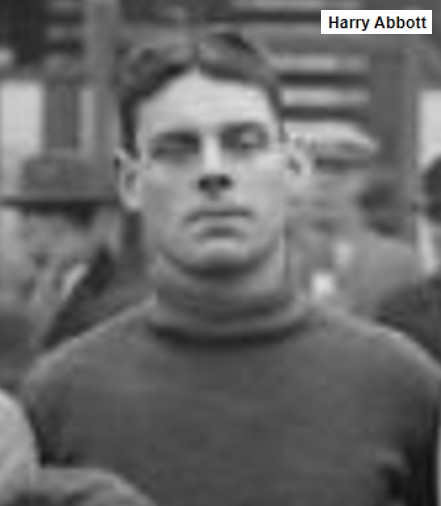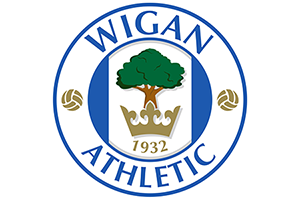Harry Abbott - Player Profile

| Full Name: | Henry Abbott |
| Born: | 15/03/1895 |
| Died: | 01/01/1968 (age 72) |
| Place of Birth: | Preston |
| Nationality: | England |
| Height: | 5 ft 10 in |
| Position: | Goal |
| First Team Debut: | 27/08/1932 v Port Vale Reserves (H) - Cheshire County League |
| Signed: | 20/08/1932 (Free) |
| Left: | 31/05/1933 (Free) |
Early Life and Introduction
Henry “Harry” Abbott was born in Preston, England, on 15 March 1895. He was an English professional football goalkeeper whose career spanned from 1914 to 1933, making over 250 senior league appearances in that time. Standing about 5 ft 10 in tall, Abbott was not exceptionally large for a keeper, but he was known for excellent agility and safe handling of the ball. He played in the Football League for clubs including Nelson, Luton Town, and Rochdale, and notably served as the first-choice goalkeeper for Wigan Athletic in the club’s inaugural 1932–33 season. The following report details Abbott’s early life, his football career before joining Wigan, his contributions during the 1932–33 season, and the notable achievements and events from his journey.
Early Career at Lancaster Town and Portsmouth (1914-1922)
Abbott grew up in Preston and began playing competitive football in his late teens. In 1914, at age 19, he joined Lancaster Town, a non-league club in Lancashire. His early career coincided with the First World War, which interrupted organized league football in England, but Abbott remained with Lancaster Town through the war years until 1921. After the war, he continued guarding the goal for Lancaster in regional competitions. His consistent performances for Lancaster Town eventually earned him a move into the professional ranks of the Football League.
In 1921, Abbott signed with Portsmouth. At that time Portsmouth were an ambitious club (soon to join England’s Second Division), and Abbott hoped to establish himself there. However, he faced stiff competition and did not make any first-team league appearances for Pompey during the 1921–22 season. He was essentially on Portsmouth’s books as a reserve goalkeeper and never got the opportunity to play in a League match for them. Seeking regular football, Abbott moved on the next year to a club where he would soon make his name.
Nelson F.C. (1922–1927): Champion of Third Division North
In 1922, Abbott joined Nelson F.C., a Lancashire club that had just become part of the new Third Division North. It was at Nelson that Abbott found regular football and became a prominent keeper. Over five seasons with Nelson (1922–1927), he made 154 league appearances for the club, cementing himself as the first-choice goalkeeper for much of that period. His arrival coincided with the most successful era in Nelson’s history. In the 1922–23 season, Nelson won the Football League Third Division North title, earning promotion to the Second Division. Abbott was part of the Nelson squad that secured the championship on 24 April 1923 with a 2–0 win over Wrexham. This triumph was a major achievement for the small club and led to an extraordinary reward: a landmark tour of Spain.
Historic Upsets: Following their Third Division triumph, Nelson embarked on a celebratory tour of Spain in May 1923. During this tour, the club made history by defeating Spanish giants Real Madrid 4–2 at the Campo de Ciudad Lineal in Madrid. In doing so, Nelson became the first English club ever to beat Real Madrid on Spanish soil. Around the same period, after moving up to the Second Division, Nelson also managed a 1–0 victory away at Old Trafford against Manchester United on 8 March 1924. These unlikely upsets – beating Real Madrid in Madrid and Manchester United in Manchester – were remarkable highlights of Nelson’s 1923–24 campaign, even though that season ultimately ended in relegation for the club. Abbott was by this time Nelson’s main goalkeeper, and he featured in Nelson’s first and only Second Division season in 1923–24, making 34 league appearances at that higher level. By the mid-1920s, his consistency between the posts had made him one of the most reliable goalkeepers in the Third Division North.
Abbott’s strong showings for Nelson did not go unnoticed. Contemporary accounts described him as “one of the most consistent goalkeepers” in the division during his Nelson tenure. He developed a reputation for agility and resilience, attributes that compensated for his relatively modest height. After Nelson returned to the Third Division North, Abbott remained the club’s starting keeper through 1926–27. His years at Seedhill (Nelson’s ground) saw him gain valuable experience and a winners’ medal from the 1922–23 title-winning campaign. By 1927, at over 32 years of age, Abbott was ready for a new challenge, and he moved south for the next chapter of his career.
Luton Town (1927–1929): Ever-Present Run and Clean Sheets
In the summer of 1927, Abbott signed for Luton Town, then competing in the Third Division South. Luton convinced him to move by recognizing his credentials from Nelson. At Luton, Abbott initially took some time to adjust to a new environment. Notably shorter than many goalkeepers (listed at about 5′9″), he relied on quick reflexes and positioning. Once settled, he became the first-choice goalkeeper and embarked on an impressive run of consecutive appearances. Abbott went on to appear in 50 straight league matches for Luton Town, also featuring in five FA Cup ties, without missing a game. During this ever-present streak, he kept 15 clean sheets, underscoring his impact on Luton’s defense. His agility and shot-stopping helped stabilize the team, and he was a fixture in the lineup throughout the 1927–28 season and into 1928–29.
Despite his personal consistency, Luton’s results were mixed and the team had some tough outings. In early 1929, Abbott’s run in the side came to an abrupt end after a heavy defeat. He was in goal on 19 January 1929 when Luton suffered a 0–5 loss away to Southend United, a result after which Abbott lost his place in the team. Following that match, the Luton manager decided to make a change, and Abbott never played for Luton Town’s first team again. By that point he had made 55 league appearances for Luton, but the Southend loss marked his final outing for the club. With his starting spot gone, Abbott left Luton later in 1929 in search of playing opportunities elsewhere.
Before departing, Abbott added to his FA Cup experience with Luton, having appeared in multiple FA Cup games (including a notable third-round tie against Crystal Palace in 1929). However, it was his league reliability – those 50 consecutive matches – that Luton supporters remembered. Abbott’s Luton chapter demonstrated that even in his thirties he could perform consistently at a high level. After leaving the Hatters, the veteran keeper made a move back to his native northwest of England to wind down his League career.
Exeter City and Rochdale (1929–1932): Final Football League Years
Upon leaving Luton, Abbott signed for Exeter City for the 1929–30 season. Exeter, a Third Division South side, likely saw Abbott as an experienced option in goal. Unfortunately, his stint at Exeter City was very brief and uneventful. Abbott did not make any official first-team appearances for Exeter in the league. He spent the 1929–30 season on Exeter’s books without breaking into the match squad, possibly serving as cover for the club’s regular goalkeeper. After a year in the West Country with no playing time, Abbott returned to more familiar territory in Lancashire.
In 1930, at age 35, Abbott rejoined Lancaster Town (the club where he had started his career) for a short period. Lancaster Town, by then sometimes referred to as Lancaster City, competed in regional leagues (Lancashire Combination). Abbott’s second spell at Lancaster (1930–1931) gave him a chance to play regularly again, albeit outside the Football League spotlight. He spent that season back with the Lancaster side before getting one last opportunity in the Football League.
For the 1931–32 season, Abbott signed with Rochdale A.F.C., a Third Division North club. Despite being one of the oldest players in the squad at 36, he became the first-choice goalkeeper at Rochdale immediately. Abbott made 32 league appearances for Rochdale in 1931–32 (out of the team’s 38 or 40 matches that season). However, this final League season proved to be a challenging and historically difficult campaign for the club. Rochdale endured a dismal run of results: they finished bottom (21st) of the Third Division North that year with only 11 points, and at one stage the team suffered 17 consecutive league defeats, setting an unwanted Football League record. Abbott, as the main goalkeeper, had the unwelcome task of picking the ball out of his net frequently; Rochdale managed only four wins all season and conceded far more goals than they scored. Despite his best efforts and experience, Abbott could not prevent the club’s collapse in form. Rochdale had to apply for re-election to remain in the League after that last-place finish. It was a tough end to Abbott’s Football League career, coming in stark contrast to the highs he had experienced at Nelson.
By the summer of 1932, Abbott was 37 years old and a free agent after Rochdale. Many players might have retired at that stage, but Abbott had one more chapter ahead. His wealth of experience and resilience made him an attractive option for a new club about to start from scratch – Wigan Athletic.
Wigan Athletic’s Inaugural Season (1932–33)
In 1932, a new club was born in Abbott’s home county: Wigan Athletic. The town of Wigan had lost its previous club (Wigan Borough) in 1931, and Wigan Athletic was formed in 1932 to carry the football torch for the community. Manager Charlie Spencer had only weeks to assemble a squad for the new club’s first season in the Cheshire County League. Henry Abbott, with nearly two decades of football behind him, was recruited as a cornerstone of this fledgling team. On 20 August 1932, Abbott signed for Wigan Athletic on a free transfer, joining the club just in time for the start of the 1932–33 season. As the most senior player on the squad, he was immediately installed as Wigan’s first-choice goalkeeper.
Abbott made his debut for Wigan Athletic in the club’s first ever competitive match on 27 August 1932. The match was a Cheshire League fixture at Wigan’s Springfield Park against Port Vale Reserves. Abbott thus had the honor of being the very first goalkeeper to play for Wigan Athletic. The occasion drew over 6,000 curious spectators to Springfield Park. Wigan, playing in red-and-white quartered shirts, ultimately lost 0–2 that day. In that historic match, Abbott unfortunately also went down in the record books as the goalkeeper who conceded Wigan Athletic’s first ever goal – Port Vale’s Jimmy McGrath scored past him early in the second half to open the scoring. Despite the defeat, Abbott’s presence in goal provided much-needed experience to a newly formed back line. The very first Wigan Athletic starting lineup was recorded as: Abbott; O’Dell, Callaghan; Allan, Spencer, Wake; Chambers, Smith, McCabe, Henderson, Murphy – with Henry Abbott guarding the net in this inaugural team.
Throughout the 1932–33 season, Abbott remained a key player for Wigan Athletic. He appeared in 31 league matches for Wigan that season. Wigan’s Cheshire County League schedule was a lengthy one (22 teams, 42 matches) and Abbott, at age 37, managed to play the majority of those games. He did miss some matches due to injury or squad rotation – backup keeper Jack Davies made 10 appearances in goal – but Abbott played in the lion’s share of fixtures. With Abbott between the posts, Wigan developed into one of the strongest defensive sides in the league. The new club exceeded expectations: Wigan Athletic conceded only 54 goals over the league campaign, the fewest of any team in the Cheshire League that year. Abbott’s veteran goalkeeping, combined with a solid defense marshalled by player-manager Charlie Spencer at center-half, gave Wigan a reliable backbone. On the offensive end, Wigan proved prolific (scoring 121 league goals) but it was often Abbott’s steadiness at the back that earned results in tight games. His contributions included multiple clean sheets and crucial saves that helped Wigan secure points.
One of the most remarkable games of Wigan’s debut season came on 22 October 1932, when Wigan Athletic defeated Northwich Victoria 9–0 at Springfield Park. It was an astonishing scoreline for a newly formed team facing an established club. Abbott was in goal for this record victory, keeping a clean sheet as Wigan’s forwards ran riot. Nearly 11,826 fans were in attendance, the largest crowd of the season, to witness Wigan’s biggest win. That thumping victory over Northwich (who were league leaders at the time) was a statement that the new Wigan club could compete at a high level. Abbott’s role in such a dominant performance – even if the spotlight was on the goalscorers – was to organize the defense and ensure no slip-ups at the back. His experience would have been vital in maintaining focus even as Wigan piled on goals.
Wigan Athletic’s inaugural season turned out to be very respectable. The team finished in fifth place in the Cheshire County League, a “very creditable” result for a first-year club. Wigan accumulated 53 points, just five points behind champions Macclesfield Town in the final table. The season also saw Wigan reach the semi-finals of the Cheshire League Cup, before bowing out 1–3 to Manchester North End. By season’s end, Abbott and his teammates could be proud of their efforts: Wigan had proven competitive, and their defensive record (only 54 conceded) was the best in the league, highlighting Abbott’s impact.
Despite his success with Wigan, the club decided to overhaul the squad for the following season to push for further improvement. At the end of the 1932–33 campaign, Abbott was released (as were the majority of the inaugural squad) when Wigan brought in a raft of new players. Abbott played his final match for Wigan in April 1933 and left the club that May. This effectively marked the end of his playing career. After nearly 19 years in senior football, Henry Abbott retired from professional competition in 1933. He had the distinction of finishing his career on a pioneering team, having been Wigan Athletic’s first-ever goalkeeper and helping establish the club’s foundations.
Later Years and Legacy
Henry Abbott stepped away from playing football after his season at Wigan Athletic. By that time, he was nearing 38 years old and had given almost two decades to the sport. He settled back in his hometown of Preston, where he lived out his post-football years. In 1968, Henry Abbott passed away in Preston, the town of his birth, at the age of 72.
Though not a household name in English football, Abbott’s career encapsulates the journeyman professional of the interwar period – a player who experienced the full spectrum of highs and lows in the game. From winning a league title with a small club and making history overseas, to enduring a record losing streak, and finally to backstopping a brand-new club’s debut season, Abbott saw it all. He is remembered in the annals of Wigan Athletic as the club’s first goalkeeper and one of the veteran leaders of that 1932–33 team. At Nelson, his contributions coincided with that club’s golden era, and his name is linked with their famous victory in Madrid in 1923. Luton Town’s archives note his remarkable run of consecutive games and clean sheets, illustrating the consistency he brought to the teams he served.
Notable Achievements and Events in Henry Abbott’s Career:
- Third Division North Champion (1922–23): Abbott was part of the Nelson squad that won the Third Division North title in 1923, earning promotion to the second tier. This remains Nelson’s only Football League title.
- First English Team to Beat Real Madrid: As a Nelson player, he toured Spain in 1923 when Nelson defeated Real Madrid 4–2 in Madrid, the first time an English club beat Real at their home ground. (That same tour also saw Nelson beat Racing Santander and Real Oviedo.)
- Victory at Old Trafford: During Nelson’s 1923–24 Second Division campaign, Abbott was in goal for the team’s shock 1–0 win against Manchester United at Old Trafford on 8 March 1924, a highlight of an otherwise difficult season.
- Ever-Present and Clean Sheets at Luton: Abbott made 50 consecutive league appearances for Luton Town from 1927 to 1929 and kept 15 clean sheets in that span, demonstrating notable consistency and reliability in goal.
- Rochdale’s 1931–32 Season: In contrast to earlier triumphs, Abbott experienced one of the Football League’s worst seasons with Rochdale, playing as goalkeeper through a run of 17 consecutive losses and a last-place finish. This illustrated his perseverance even when results went against the team.
- Wigan Athletic Pioneer (1932–33): Abbott served as Wigan Athletic’s first goalkeeper in their inaugural season. He made 32 appearances for Wigan that year and helped the new club achieve the league’s best defensive record (only 54 goals conceded), finishing 5th in the Cheshire League. His veteran presence was vital in establishing Wigan Athletic’s early credibility.
Henry Abbott’s career is a testament to early 20th-century football history. He may not have gained the fame of top-division stars, but his name is woven into the stories of several clubs. From Preston to Wigan, his journey reflects the dedication of a player who loved the game. Abbott’s legacy lives on through the records and memories at clubs like Wigan Athletic – where every goalkeeper to this day follows in the footsteps of the man who first filled that role back in 1932. His story provides a fascinating glimpse into the life of a goalkeeper in English football’s bygone era.
Wigan Athletic Career
| League | FA Cup | League Cup | Other | Total | |||||||
|---|---|---|---|---|---|---|---|---|---|---|---|
| Season | Apps | Goals | Apps | Goals | Apps | Goals | Apps | Goals | Apps | Goals | |
| 1932-1933 | 31 (0) | 0 | 0 (0) | 0 | 0 (0) | 0 | 3 (0) | 0 | 34 (0) | 0 | |
| TOTALS | 31 (0) | 0 | 0 (0) | 0 | 0 (0) | 0 | 3 (0) | 0 | 34 (0) | 0 | |


